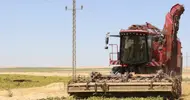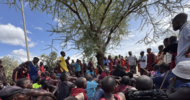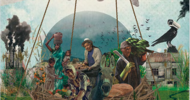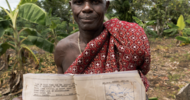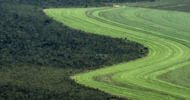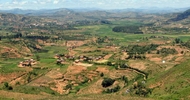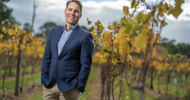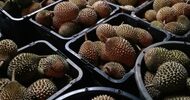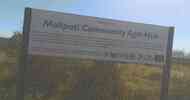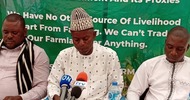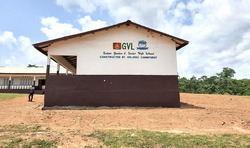
A school built by Golden Veroleum in Butaw, Sinoe County. The school is part of the arrangement that the company must contribute to Liberia’s development. But the teachers are still waiting for their salary. (Photo: Jeroen Groot)
(Translation by Milieudefensie)
The oil palm: a sad harvest
Palm oil is the most frequently used vegetable oil in the world, but it is also highly controversial. In Indonesia and Malaysia, rain forest was destroyed and local farmers were chased off their land. Palm oil plantations are now emerging in other areas around the equator. Financieele Dagblad (FD) visited poverty-stricken Liberia where - in part thanks to pressure from ‘sustainably’ thinking Western financiers - things were supposed to be going better. But are they?
Text and photos by Jeroen Groot
In brief
• Palm oil is used in roughly half of the composite products found in the average supermarket.
• The massive boom of the 'wonder oil' has a dark downside: the destruction of forests and brutal expropriations.
• In the West African state of Liberia, the rise of the oil palm is a relatively new phenomenon.
• Will history repeat itself, or does Liberia offer a chance to do things better?
Occasious Sarckor is angry. Despite the scorching heat, he strides back and forth across the palm oil plantation. In his loud voice, with wildly gesturing arms, he points out what used to be his. Here: banana trees. There: a stream. Just look at the rippling in the landscape; that used to be the shore. There he cultivated rice, plantains, pineapples - until the bulldozers came and it all disappeared.
‘The banana trees came up one more time,’ says Occasious. ‘After that, the weed killers did the rest.’
The plantation exudes an eerie silence. Oil palms have been planted as far as the eye can see. Short, squat trees, topped by a wide crown of green, planted in tidy rows: a bizarre sight in a country that, until recently, was covered in heavy jungle. At the top of the stem, where the leaves start, the same orange-red fruits are growing everywhere. This is where palm oil comes from. Weeds grow on the ground - if they get a chance, that is.
Everything on the plantation looks green, but it is an ecological desert. Nothing grows here but palm trees. And there are hardly any animals. At most a few birds, some small rodents and snakes.
‘You have to leave’
We assume that we are alone, unobserved. It’s midday in rural Liberia and the sun is high in a clear blue sky. The rainy season is about to start and it’s boiling hot. Everyone is sweating.
A couple of small veins stand out on Occasious’s bald head. This, plus the white hairs in his Van Dyck beard, are suggestive of his age. In a country where the average life expectancy is 64, Occasious will soon be 52. He is wearing poorly fitted blue jeans and a white T-shirt with the photo of a local politician, who in the latest elections promised the Liberians a better life, just as his predecessors did.
Occasious points to a hill hundreds of metres further on. That used to be the border of his land. We climb into our hired car, an old model Toyota Land Cruiser. Maybe we can capture the huge magnitude of the plantation in a photograph from the hill.
But then a man on a small, light-weight motorbike suddenly appears on the hill. Despite the silence, we didn’t hear him coming. He introduces himself as a supervisor from Golden Veroleum Liberia, the owner of the plantation. Although he is not wearing a uniform, that doesn’t mean much in Liberia. On our way here from the capital city of Monrovia, a full day of travel, we were stopped a number of times at checkpoints. Surly-looking men in colourful T-shirts and shorts, wearing thongs, asked for our papers. Police and other officials here are often paid late or not at all, and uniforms are scarce as well. The farther away from Monrovia, the worse this problem becomes.
‘You have to leave here. This is private property,’ says the man. The fact that we are not standing on the plantation, but next to it, makes no difference to him. The country road alongside the plantation is also property of Golden Veroleum, he says. Occasious stays calm. The two men stand next to the white Toyota and start to converse - in Liberian English, interspersed with African sounds. They reveal the intention and emotion of the speaker.
The man from the palm oil company thinks that Occasious should stop talking about his land and should not speak to journalists. After all, it was a great many years ago, and he was given money, wasn’t he?
Threatened
The last time Occasious stood here and told his story, he was accompanied by Alfred Brownell, a well-known Liberian lawyer who stands up for the environment and the rights of local farmers such as Occasious. Brownell won an international and highly prestigious prize for his work: the Goldman Environmental Prize. This is regarded as the Nobel Prize for conservationists. Proof of bravery, and justly so. Two prize winners were killed in recent years.
Brownell, too, almost had to pay with his own life for a visit to a palm oil plantation. His car was surrounded and the plantation’s security people threatened to cut off his head. The lawyer fled to the United States, where he still lives.
We leave. The story has been told; the pictures taken. This time the old Toyota has no difficulties and starts straight away. ‘That man from Golden Veroleum comes from my village,’ Occasious says from the back seat. ‘We know each other. But now we are enemies.’
The story of Occasious and Butaw, the village where he lives, does not stand on its own. Around the equator, where the oil palm (Eleais guineensis) grows the best, a fierce battle is going on about land. The plantations offer work in places where work is extremely welcome. At the same time, the large-scale cultivation of the oil palm in developing countries goes hand in hand with serious malpractices.
Jungle is burned down
Jungle is bulldozed and burned down. In recent decades, millions of hectares of forest disappeared in Indonesia and Malaysia. The deforestation contributes to global warming, and wild animals such as apes and tigers are dying out.
If no forest is felled for it, the plantations are often built on land already in use that belongs to local farmers. They don’t have ownership papers, but have cultivated that land for generations. Such as Occasious. For years, environmental and human rights organisations such as Milieudefensie/Friends of the Earth Netherlands, Greenpeace and Human Rights Watch have instituted protest actions against the abuses, but the oil palm continues its advance all over the world.
Because, for the food industry, palm oil is nothing less than a gift from the gods. Roughly half of the composite products in an average supermarket contain palm oil. The raw material is highly versatile and easy to process, and therefore has a diverse range of applications. Cookies are crispy and crunchy thanks to palm oil. Ice cream melts less quickly. Detergent and shampoo foam and lather thanks to palm oil. Peanut butter with palm oil stays smooth and creamy and does not separate.
It is also used extensively in cosmetics such as lipstick, and it goes into fuel tanks of cars and lorries as biodiesel. Instead of biodiesel, a different vegetable oil could be used, and the same applies to many foodstuffs as well as food. All home cooks know that you can also use butter to bake cookies.
But palm oil has yet another advantage for buyers: it is cheap.
An efficient plant
Under the right circumstances, palm fruits can be harvested on a palm oil plantation every ten days. No other plant provides so much vegetable oil per hectare. The plantations are found in countries where pay is low and land is cheap or, in the case of land grab, ‘free’. Demand continues to grow all over the world, and so does the hunger for land. In Southeast Asia, land is growing scarce, and the rules are becoming stricter. The government of Indonesia, the world’s largest palm oil producer, has announced a prohibition on felling trees for palm oil plantations. And so the producers look for new land.
In Liberia, cultivation on a very large scale is a relatively new phenomenon. From 1989 to 2003 the country was embroiled in a gruesome civil war. The pictures of drugged child soldiers with Kalashnikovs and grenade launchers went all over the world. It took a long time before foreign investors were willing to put their money into Liberia again.
We drop Occasious off in the centre of his village, Butaw. Indeed, he was paid money for his land, as he told us earlier. One hundred and fifty US dollars: a fraction of what his harvests would yield. Those yields were meant to finance a real house for his children, a house built of concrete. He started out again on the other side of the village, on a new patch of land. But the yield it generates is much lower.
Most houses in Butaw are made of mud, with a roof of palm leaves or corrugated plates. There is no running water and no electricity. Stripped car wrecks, robbed empty, lie along the side of the road. The road to Butaw is unpaved, full of holes, and in the rainy season it is practically impassable. The poverty in this country, only seven hours from the Netherlands by plane, is gripping.
Profit is for the local elite
And then to think that Liberia is blessed with a fertile climate and a wealth of raw materials. To many developing countries, in Africa but elsewhere as well, those raw materials mean no less than a curse. Foreign companies and the local elite get the profits, the ordinary population gets nothing or is fobbed off with crumbs.
As we drive through the village, we suddenly pass a large, brand-new building, made of concrete. It is the village school. Compared to the format of the other structures in Butaw, the school is huge, and the Liberian flag waves on the lawn. It is clear at a glance who paid for the school: large letters on the wall say ‘Constructed by GVL’.
The concession contract concluded by Golden Veroleum with the government in 2010 states that the company must contribute to Liberia’s development - by creating jobs and building schools, for example. In developing countries, laws and rules often exist only on paper, but just as in Southeast Asia, here too, non-governmental organisations (NGOs) are active: the Green Advocates, for instance, founded by Alfred Brownell, and the Sustainable Development Institute (SDI), a sister organisation of the Dutch Milieudefensie. All those organisations published reports showing injustices. The results were piecemeal, but positive.
Western consumers set high requirements
There is pressure not only from inside Liberia, but from outside it as well. More and more consumers in the developed world no longer want products for which human rights have been violated or the environment destroyed. A certification called the RSPO (Roundtable on Sustainable Palm Oil) has been established. Its aim is to promote better conduct on the part of palm oil companies. Golden Veroleum, controlled by the Indonesian-founded palm oil giant Golden Agri-Resources, is a member.
In recent years, SDI, Green Advocates and a whole range of other NGOs submitted complaints about Golden Veroleum to the RSPO and the High Carbon Stock Approach (HCSA), an organisation meant to curb deforestation. Their complaints are about the felling of tropical rain forests, but also about land grabbing. Palm oil companies are not allowed simply to start up a plantation, but must first consult with the local community. The locals must then agree to the plantations on their land, and for that they get something in return in the form of education and jobs.
According to the NGOs, Golden Veroleum does not follow through on agreements, and in some cases the villagers are pressured into consenting. The RSPO and the HCSA have declared the complaints to be well-founded: Golden Veroleum has to go back to the negotiating table and may not construct any new plantations until the problems have been resolved. These talks are moving forward with difficulty. In the meantime, the company boasts in its own sustainability bulletin as well as to journalists about the contributions it makes to the local community.
Including this school in Butaw.
Agreements were not followed through
‘We are happy with the school,’ says teacher Kwame Itoka, once we are inside. ‘It took a long time, but we have been open since the beginning of the year.’ Itoka and his colleagues are not so happy with the salary. ‘Some of the teachers were supposed to be paid by Golden Veroleum as from January. But they have not been.’
The promised pens and notebooks have not arrived either, and very little has been seen of the ‘complete sanitary facilities’ referred to in the sustainability bulletin. Just like the rest of the village, the school has no running water. ‘Golden Veroleum should do more,’ Itoka says diplomatically. Is history repeating itself after all?
There is another way to apply pressure: nowadays NGOs focus on the financiers of palm oil companies. Investors and banks say that their investments must be ‘sustainable’, and that they want to spur the companies they finance to exhibit better behaviour. Developing palm oil plantations costs a lot of money, and criticism from the financiers ought to make an impression.
From the Netherlands, Golden Agri-Resources received loans from Rabobank and ABN Amro, two banks that pride themselves on their sustainable policy. And there is yet another palm oil company in Liberia with ties to a Dutch bank.
With aid from a Dutch development bank
We travel on to Maryland County, one of the most remote areas in Liberia. Close to the city of Pleebo, at the border with Ivory Coast, is the plantation of the Maryland Oil Palm Plantation (MOPP). MOPP is not a member of the RSPO, but would very much like to be. Parent company SIFCA, from Ivory Coast, receives financing from development banks, one of which is the Dutch FMO. This financing is a form of development aid, and development banks set high standards for the companies to which they lend money. But MOPP too has been the object of criticism from NGOs for years, for the same reasons as Golden Veroleum.
On our way, it starts to rain. We need to hurry. Once the rainy season really kicks in, there will be nowhere we can go. Already, the road is regularly blocked by dilapidated lorries and pick-ups, heavily loaded, extremely old and sunk deep into the yellowish-brown muck. When we get going again, we pass slow, heavily laden lorries with trailers. They carry enormous, newly felled tree trunks. Along the roadside, the Liberians see their forest disappearing.
It’s raining in the village of Gewloken Town too when we arrive. Our car crawls like a much too clumsy mechanical monster, as carefully as possible, between the mud huts that are built on small hills. We stop in front of the house of Saturday Wilson, a local farmer. Soon we are joined by the neighbours under the corrugated roofing overhang, curious about the unusual visitors. Kola nuts are brought out, neatly sliced and served in metal bowls. Everyone eats some nuts, the European visitor first. An obligatory ritual: this is how you show that your intentions are good. Not until the bitter, caffeine-rich nuts have been rinsed away with water and chilli powder do the villagers tell their stories.
‘MOPP is trying to grab my land’
Saturday Wilson has his own palm oil plantation; it borders on MOPP’s. His plantation is much smaller, but Saturday earns his living with it. At least if he is not hassled by his neighbour and sent to jail again. ‘For years, MOPP has been trying to grab my land,’ says Saturday.
He was in jail twice, once when he obstructed the bulldozers and once on suspicion of theft. He allegedly stole palm fruits and chemical fertiliser. He was released; according to the judge, Saturday and MOPP had to sort out the dispute themselves. Saturday denies the thefts and says that it was in fact MOPP’s personnel who stole from him. Later he will show a letter to MOPP with a polite request for compensation. It gained him nothing but an equally polite confirmation of receipt.
Next to Saturday is Lewis Thompson. Lewis got up at five o’clock this morning. A lorry from MOPP, packed with the other workers, brought him to the plantation. There he removes weeds between the oil palms using a slashing iron, a sort of scythe. He points to his shoulders: they are painful because he constantly makes the same movements. Lewis works as hard as he can: every day he is expected to slash the weeds around 54 oil palms. He is employed there, but despite the fact that he is an employee, if he doesn’t meet his quota, the overseers write ‘absent’ after his name and he receives no pay for that day. This is the way things go, every day, six days a week.
‘Working is better than stealing’
Still, Lewis is relatively well off. His salary is slightly higher than the minimum wage in Liberia, and he is a member of the trade union. Nevertheless, he thinks the work is too hard and the salary too low. But he has no choice. His family no longer holds any land. ‘Grabbed by MOPP.’ Sometimes Lewis is assigned to the group that uses pesticides to remove weeds. This scares him. He doesn’t know exactly what they use, but while he is working with the poison, red spots dance in front of his eyes.
Lewis Thompson is not his real name, but he fears he will lose his job if MOPP learns that he has complained about working conditions. Not only his wife and children, but also a large portion of the rest of the family, are all dependent on his salary. He earns $118 net for one month’s work. ‘Working is better than stealing,’ he points out.
Despite all the hardship, no one we talk to in Liberia wants to see the palm oil companies leave. ‘Development’ is the word you hear everyone use. Everyone wants progress, a school for their children, better jobs. The palm oil industry could contribute to this, but it has thus far not done much that is positive. Can pressure from NGOs, financiers and clients ensure that for once, the sad tale of the oil palm does not repeat itself?
Cautious optimism
Silas Siakor thinks so. When we talk with him in Monrovia, he is, as he puts it, ‘cautiously optimistic’. He is an activist and, just like Alfred Brownell, he won the Goldman Environmental Prize. And just like Brownell, he had to fear for his life. But Silas stayed. According to him, the safety situation has improved.
Silas founded the NGO SDI, but nowadays he works for the Sustainable Trade Initiative IDH, an organisation financed in part by the Dutch government, which attempts to improve the situation in developing countries with public-private cooperation. Silas is also aware of the scepticism about the quality marks. Golden Veroelum is still a member of the RSPO, despite a whole catalogue of grievances. ‘But on account of the complaints, Golden Veroleum has thus far only been able to develop a small part of the concession. The palm oil companies are trapped in a corner. We need to find a different development model, one where we leave more forest standing and the villagers benefit as well.’
Is he not afraid that the companies will just leave if things are made too difficult for them in Liberia? A brief smile passes his face. ‘I think that, all over the world, it’s becoming more and more difficult to find sites for plantations. That’s why the palm oil companies are here.’
This publication is supported by a contribution from the investigative journalism scheme of the Dutch Fund for In-depth Journalism.
Reactions of palm oil companies
In a response to FD, Golden-Agri Resources states that it closely follows all complaints against Golden Veroleum and that Golden Veroleum will definitely not develop any new plantations until the problems have been resolved. The company will communicate the findings of this newspaper to Golden Veroleum so that company can take action. Furthermore, Golden-Agri Resources also claims that the negotiations with the community in Butaw have been suspended following a conflict about the mediator appointed by Golden Veroleum. The Roundtable on Sustainable Palm Oil (RSPO) subsequently appointed a new mediator; however, that person did not have the approval of the residents of Butaw and the NGOs involved. Both parties are waiting for new instructions from the RPSO.
SIFCA, the parent company of the Maryland Oil Palm Plantation (MOPP), responded to questions from this newspaper only after long and repeated insistence from FD. A spokesperson says that the allegations made in the article are false and that the practices described are contrary to their own sustainability criteria. According to SIFCA, attempts were made to reach a settlement with Saturday Wilson as to MOPP’s thefts, but he chose to bring the matter before the court.
SIFCA claims that it hasn’t received any indications of health complaints from employees and says that the teams that work with pesticides are issued sufficient protective clothing. Moreover, permanent employees are screened once a year, and if they work with pesticides, twice a year, by the medical staff. The company will not say what pesticides are used. According to SIFCA, the employees of MOPP must be paid in proportion to the work carried out, even if they do not reach the quota for weeding around 54 palm trees.
Reactions of Dutch financiers
Development bank FMO calls the information on the misconduct at MOPP in this article worrisome, and says that they will discuss it with MOPP and Milieudefensie. The bank has since obtained information from MOPP, but at the same time says it is aware that there is more than one perspective to every story and that reality is sometimes not the same as the story on paper. FMO states that when the loan was furnished to SIFCA, a comprehensive improvement plan was agreed. The implementation is not taking place as quickly as FMO would like, but the bank is confident that SIFCA is willing to deal with the problems. The bank stresses the fact that improving the circumstances in countries such as Liberia is a matter of patience and perseverance.
On account of the confidential relationship with clients, Rabobank states that it cannot go into detail on individual cases. However, the bank does say that if Golden Veroleum were to call upon Rabobank today for support in the form of a loan, the answer would be an unequivocal no. Rabobank is part of the RSPO and states that it will bring the information in this article on Golden Veroleum to the attention of that organisation. ABN Amro in the process of phasing out the loan to Golden-Agri Resources. This is on account of a change in strategy: last year, the bank announced that it would cease international trade financing and commodity trading, including financing of palm oil companies. Nevertheless, the bank says that it takes the notifications on injustice and misconduct seriously and will discuss them with the client.
PGGM, that invests the pensions for healthcare pension fund PFZW, until recently had an equity interest in the listed company Golden-Agri Resources and in Wilmar, a large palm oil company that has a 27% interest in SIFCA via a subsidiary. The shares have since been sold because the pension investor saw insufficient improvement in the sustainability policy of the companies. Investor Robeco still sees room for improvement and is still a shareholder in both companies. Insurer NN Group also has a shareholding in Wilmar. Both Robeco and NN Group stated that they were working on communicating with palm oil companies in which investments are made, so as to combat abuses.
In a response to FD, Golden-Agri Resources states that it closely follows all complaints against Golden Veroleum and that Golden Veroleum will definitely not develop any new plantations until the problems have been resolved. The company will communicate the findings of this newspaper to Golden Veroleum so that company can take action. Furthermore, Golden-Agri Resources also claims that the negotiations with the community in Butaw have been suspended following a conflict about the mediator appointed by Golden Veroleum. The Roundtable on Sustainable Palm Oil (RSPO) subsequently appointed a new mediator; however, that person did not have the approval of the residents of Butaw and the NGOs involved. Both parties are waiting for new instructions from the RPSO.
SIFCA, the parent company of the Maryland Oil Palm Plantation (MOPP), responded to questions from this newspaper only after long and repeated insistence from FD. A spokesperson says that the allegations made in the article are false and that the practices described are contrary to their own sustainability criteria. According to SIFCA, attempts were made to reach a settlement with Saturday Wilson as to MOPP’s thefts, but he chose to bring the matter before the court.
SIFCA claims that it hasn’t received any indications of health complaints from employees and says that the teams that work with pesticides are issued sufficient protective clothing. Moreover, permanent employees are screened once a year, and if they work with pesticides, twice a year, by the medical staff. The company will not say what pesticides are used. According to SIFCA, the employees of MOPP must be paid in proportion to the work carried out, even if they do not reach the quota for weeding around 54 palm trees.
Reactions of Dutch financiers
Development bank FMO calls the information on the misconduct at MOPP in this article worrisome, and says that they will discuss it with MOPP and Milieudefensie. The bank has since obtained information from MOPP, but at the same time says it is aware that there is more than one perspective to every story and that reality is sometimes not the same as the story on paper. FMO states that when the loan was furnished to SIFCA, a comprehensive improvement plan was agreed. The implementation is not taking place as quickly as FMO would like, but the bank is confident that SIFCA is willing to deal with the problems. The bank stresses the fact that improving the circumstances in countries such as Liberia is a matter of patience and perseverance.
On account of the confidential relationship with clients, Rabobank states that it cannot go into detail on individual cases. However, the bank does say that if Golden Veroleum were to call upon Rabobank today for support in the form of a loan, the answer would be an unequivocal no. Rabobank is part of the RSPO and states that it will bring the information in this article on Golden Veroleum to the attention of that organisation. ABN Amro in the process of phasing out the loan to Golden-Agri Resources. This is on account of a change in strategy: last year, the bank announced that it would cease international trade financing and commodity trading, including financing of palm oil companies. Nevertheless, the bank says that it takes the notifications on injustice and misconduct seriously and will discuss them with the client.
PGGM, that invests the pensions for healthcare pension fund PFZW, until recently had an equity interest in the listed company Golden-Agri Resources and in Wilmar, a large palm oil company that has a 27% interest in SIFCA via a subsidiary. The shares have since been sold because the pension investor saw insufficient improvement in the sustainability policy of the companies. Investor Robeco still sees room for improvement and is still a shareholder in both companies. Insurer NN Group also has a shareholding in Wilmar. Both Robeco and NN Group stated that they were working on communicating with palm oil companies in which investments are made, so as to combat abuses.



